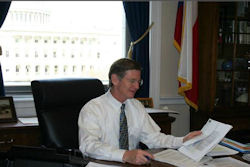 SOPA would threaten Internet freedom? - "Blatantly false", says lawmaker.
SOPA would threaten Internet freedom? - "Blatantly false", says lawmaker.
Smith chairs the House Judiciary Committee and is the lead sponsor of the bill. Writing in the National Review Online, Smith stressed that SOPA only targets websites that are "dedicated" to illegal activity, whether it be peddling counterfeit goods or pirated movies.
He argued that the United States congress could not just sit back and watch as some of America's most profitable and productive industries come under attack, to the tune of up to $100 billion per year. One of SOPA's main functions would be to block revenue to rogue websites, the majority of which would be located outside the United States, and vehemently rejected claims that legitimate websites would get caught in the middle.
"Websites like Facebook and YouTube that host user content are not 'dedicated to' illegal activity, and they certainly do not make a business out of 'facilitating' the illegal sale and distribution of counterfeit or pirated goods," Smith wrote.
He saved special criticism for Google Inc., which has come out in opposition to the Stop Online Piracy Act (SOPA).
"Unfortunately, there are some critics of this legislation who are not serious about helping to protect America's intellectual property. That's because they've made large profits by working with and promoting rogue sites to U.S. consumers. Google recently paid half a billion dollars to settle a criminal case because of the search-engine giant's active promotion of rogue foreign pharmacies that sold counterfeit and illegal drugs to U.S. patients. Their opposition to this legislation is self-serving since they profit from doing business with rogue sites."
He also pointed out that the First Amendment to the United States constitution does not protect illegal activity, likening the problem of Internet piracy to that of child pornography.
"Like online piracy, child pornography is a billion-dollar business operated online. It is also illegal. That's why law enforcement officials are authorized to block access to child-porn sites," he wrote.










